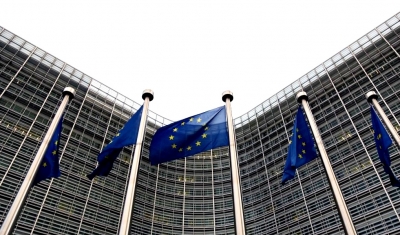Global wheat prices have spiked 15 percent in the week since Russia quit a deal that allowed the safe Black Sea export of Ukraine grain for a year…reports Asian Lite News
The United Kingdom has warned that it has information indicating Russia’s military may start to target civilian shipping in the Black Sea, as the European Union pledged to help Ukraine export almost all its farm produce via rail and road.
Global wheat prices have spiked 15 percent in the week since Russia quit a deal that allowed the safe Black Sea export of Ukraine grain for a year and began targeting Ukrainian ports and grain infrastructure on the Black Sea and Danube River.
“Our information indicates that the Russian military may expand their targeting of Ukrainian grain facilities further, to include attacks against civilian shipping in the Black Sea,” the UK’s United Nations Ambassador Barbara Woodward said on Tuesday.
Prime Minister Rishi Sunak shared the information with Ukrainian President Volodymyr Zelenskyy during a phone call on Tuesday, Woodward told reporters. Britain also had information that “Russia has laid additional sea mines in the approaches to Ukrainian ports”, she said.
“We agree with the US assessment that this is a coordinated effort to justify and lay blame on Ukraine for any attacks against civilian ships in the Black Sea,” Woodward said.
The White House gave similar warnings last week about possible Russian attacks on civilian ships and sea mines.
The Black Sea grain deal was brokered by the UN and Turkey a year ago to combat a global food crisis worsened by Russia’s February 2022 invasion of Ukraine. Both Ukraine and Russia are leading grain exporters.
Russia withdrew last week, saying that demands to improve its own food and fertiliser exports had not been met and complaining that not enough Ukrainian grain had reached poor countries under the deal.
The UN has argued that the pact benefited poorer countries by lowering global prices 23 percent since March 2022.
Russian President Vladimir Putin is due to host African leaders in St Petersburg on Thursday and Friday and has promised free Russian grain “to replace Ukrainian grain”. The UN said the most vulnerable will pay the highest price for Moscow’s decision to terminate the Black Sea agreement.
Kremlin foreign policy adviser Yury Ushakov told Russian media on Tuesday that 17 African leaders would speak at the summit.

EU ‘solidarity lanes’
The EU said on Tuesday that it was ready to export almost all of Ukraine’s farm produce via road and rail “solidarity lanes” through neighbouring EU countries and help cover transportation costs.
“We are ready to export almost everything. This is about four million tonnes per month of oilseeds and grains and we achieved this volume in November last year,” EU Agriculture Commissioner Janusz Wojciechowski said.
Wojciechowski said that the EU was looking to come up with a joint plan to cover the additional transport costs.
Expanding grain transit through the EU is sensitive for Poland and some countries bordering Ukraine, where farmers have come under pressure from increased Ukrainian imports.
In May, the EU allowed five countries close to Ukraine – Bulgaria, Hungary, Poland, Romania and Slovakia – to ban domestic sales of Ukrainian wheat, maize and oilseeds until September 15, while allowing transit through them for onward export.
The EU will review the ban after several countries pushed for an extension beyond September 15.
Polish Agriculture Minister Robert Telus told reporters on Tuesday that he wanted a flexible ban, explaining as an example that Poland wanted to prohibit raspberries, but would allow sunflower seeds.
“There is no way that after September 15 Ukraine grain will enter Poland,” Telus said. “We have quite a lot of grain, prices of grain already today are low … it would completely destabilise our market.”
EU member Lithuania has asked the European Commission to develop a route for Ukrainian grain through five ports in the Baltic states of Estonia, Latvia and Lithuania, the Reuters news agency reported, citing a letter. The five ports have a combined grain export capacity of 25 million tonnes, the letter said.
The railways of Ukraine and the Baltic states are built on a Russian-type gauge, which is incompatible with the railway gauge used in Poland, the only practical route between the countries.
In Washington, US Agency for International Development Administrator Samantha Power told reporters that the United States would look at putting more money toward silos and other storage so Ukraine’s grain harvests “don’t rot while they wait to reach global markets”.
Power said the US would focus in part on helping farmers get access to finance. “Their profit margins are just getting smaller and smaller,” she said.














